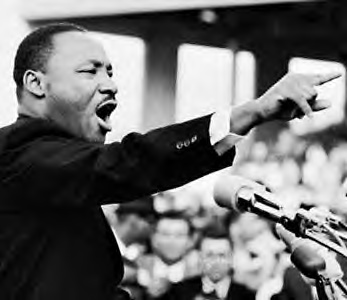 We recognize Martin Luther King Jr. as a worldwide leader
because of his inspirational speeches and what he indeed did
for the oppressed and condemned in the United States. The
media has played a very important role in the image of this
leader through out the years. Among the readings spread on
the Web, I found an interesting article from Dr. Peter J.
Ling in a BBC website.
We recognize Martin Luther King Jr. as a worldwide leader
because of his inspirational speeches and what he indeed did
for the oppressed and condemned in the United States. The
media has played a very important role in the image of this
leader through out the years. Among the readings spread on
the Web, I found an interesting article from Dr. Peter J.
Ling in a BBC website.
I was going to post this yesterday but I decided to wait and now I see that someone else considered the same text, but with a different focus. Ling’s article has several topics, including one called The “Great Leader” Myth, in which the author points out that King’s leadership was questioned during his lifetime and after his death.
Martin Luther King had different supporters and detractors: people believing in non-violence and human rights and others that just considered him a threat, not sharing his vision of freedom without violence. They questioned many of the events in which he was involved and how some of them were planned with specific purposes.
“While King rarely relaxed in public, especially in white company, his conspicuous gravitas commanded respect. This persona was partly why he was chosen to lead the Montgomery bus boycott, and why he emerged to publicize not just the boycott, but the freedom struggle in general. The media quickly spotted his ability to articulate the moral dimensions of the struggle in ways that appealed to moderate public opinion, especially away from the South. He made it easier to accept change.”
“As a leader, King had to end the possibility of ‘business as usual’. He had to threaten racial catastrophe, while simultaneously holding out the promise of racial peace. He needed compelling images of the nightmare, as well as the dream.”
There is no doubt that King fought for peace and justice to the extent of giving his life for his cause. He was truly a leader for civil rights who brilliantly ended up knowing what to do in order to achieve his objectives. King became a point of balance, and the center of significant civil rights movements in the United States.
“There were many leaders in the civil rights struggle, but Martin Luther King was more than just the most conspicuous of them, and more than just an eloquent speaker. His non-violence inspired some support, but it also appealed vitally to neutrals in a way that negated more conservative voices. No one else matched his leadership of targeted, orchestrated campaigns that strengthened national political strategy.”
By Fernando Aguilar / @fjaguilarr
Note: Quotes taken from the article Martin Luther King’s Style of Leadership, by Dr. Peter J Ling
Article: http://www.bbc.co.uk/history/recent/martin_luther_king_01.shtml

There are some very important points brought up in the article you referenced. I think Martin Luther King Jr.’s charisma and ability to captivate an audience certainly advanced his cause for the better, which everyone in this country and the world should be grateful for. You also mention his ability to pick out and highlight certain instances that would draw press attention, though some may see this as somehow insincere I think it shows that King put thought and strategy into his leadership and knew what would give strength to his cause.
I agree. There are strategies. The questions is if that is ethically legit. Politically it is, but there is a thin line there. Leaders also respond to circumstances and decisions are taken based on those.